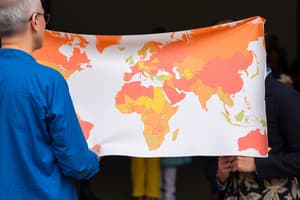Podcast
Questions and Answers
What is culture?
What is culture?
Culture is a system of ideas, values, beliefs, knowledge, norms, customs, and technology shared by almost everyone in a particular society.
What is ethnocentrism?
What is ethnocentrism?
Ethnocentrism is the view that one's culture and society is superior.
Which demographic tends to be the most ethnocentric?
Which demographic tends to be the most ethnocentric?
Ethnocentrism is most likely found among individuals who believe their culture is superior.
What is cultural relativism?
What is cultural relativism?
What is xenocentrism?
What is xenocentrism?
What is temporocentrism?
What is temporocentrism?
Temporocentrism is most prevalent amongst which demographic?
Temporocentrism is most prevalent amongst which demographic?
What are the 6 key elements of culture?
What are the 6 key elements of culture?
What is the Sapir-Whorf hypothesis?
What is the Sapir-Whorf hypothesis?
What are values?
What are values?
What are norms?
What are norms?
What is technology?
What is technology?
What is cultural lag?
What is cultural lag?
What are subcultures?
What are subcultures?
Does the dominant culture and subculture conflict?
Does the dominant culture and subculture conflict?
What are countercultures?
What are countercultures?
What is the ideal culture?
What is the ideal culture?
What is the real culture?
What is the real culture?
What is multiculturalism?
What is multiculturalism?
What are idiocultures?
What are idiocultures?
Flashcards are hidden until you start studying
Study Notes
Culture
- Defined as a system of shared ideas, values, beliefs, knowledge, norms, customs, and technology within a society.
Ethnocentrism
- The belief in the superiority of one's own culture over others.
- Certain demographics may be more ethnocentric, though specifics are not provided.
Cultural Relativism
- The perspective that cultures should be evaluated based on their own standards, not by those of another culture.
- Researchers maintain their critical stance without necessarily adopting foreign cultural values.
Xenocentrism
- A belief that other cultures are superior to one's own, in contrast to ethnocentrism.
Temporocentrism
- The belief that the present time period is of greater significance than past or future eras.
- Common among individuals lacking historical perspective.
Key Elements of Culture
- Six essential components are symbols, language, values, norms, technology, and material culture.
Sapir-Whorf Hypothesis
- Suggests that the language structure influences a speaker's perception and categorization of experiences.
Values
- Shared societal beliefs regarding what is deemed important and worthwhile; they vary between cultures.
Norms
- Rules of conduct or social expectations that dictate behavior within a society.
Technology
- Involves the application of scientific knowledge that impacts various cultural aspects.
Cultural Lag
- A phenomenon where technological advances outpace changes in non-material culture, leading to an adjustment period.
Subcultures
- Groups within a larger society that retain distinct cultural elements, including norms, values, and symbols while sharing some broader cultural traits.
Dominant Culture vs. Subculture
- Conflicts may arise between dominant cultures and subcultures due to differing beliefs and practices.
Countercultures
- Subcultures that actively reject and oppose prevailing cultural norms and values.
Ideal vs. Real Culture
- Ideal culture reflects professed norms and values, while real culture denotes actual behavioral practices; discrepancies often exist, as seen in attitudes towards adultery in the U.S.
Multiculturalism
- An approach that recognizes and values the contributions of diverse cultures instead of pushing for standard assimilation.
Idiocultures
- Unique cultural systems that develop within small groups, marked by shared experiences and memories, such as those in sports teams.
Studying That Suits You
Use AI to generate personalized quizzes and flashcards to suit your learning preferences.




